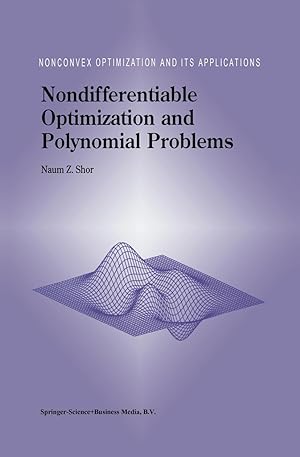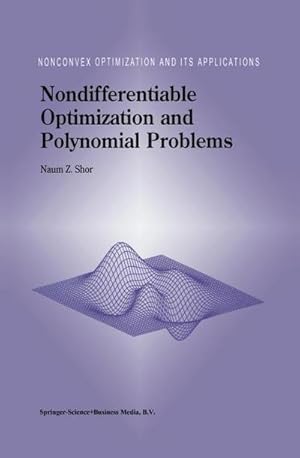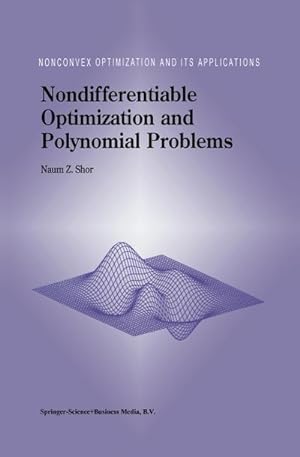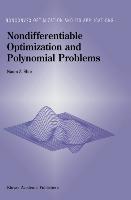nondifferentiable optimization polynomial problems de shor n z (14 resultados)
Filtros de búsqueda
Tipo de artículo
- Todos los tipos de productos
- Libros (14)
- Revistas y publicaciones (No hay ningún otro resultado que coincida con este filtro.)
- Cómics (No hay ningún otro resultado que coincida con este filtro.)
- Partituras (No hay ningún otro resultado que coincida con este filtro.)
- Arte, grabados y pósters (No hay ningún otro resultado que coincida con este filtro.)
- Fotografías (No hay ningún otro resultado que coincida con este filtro.)
- Mapas (No hay ningún otro resultado que coincida con este filtro.)
- Manuscritos y coleccionismo de papel (No hay ningún otro resultado que coincida con este filtro.)
Condición Más información
- Nuevo (12)
- Como nuevo, Excelente o Muy bueno (2)
- Bueno o Aceptable (No hay ningún otro resultado que coincida con este filtro.)
- Regular o Pobre (No hay ningún otro resultado que coincida con este filtro.)
- Tal como se indica (No hay ningún otro resultado que coincida con este filtro.)
Encuadernación
Más atributos
- Primera edición (No hay ningún otro resultado que coincida con este filtro.)
- Firmado (No hay ningún otro resultado que coincida con este filtro.)
- Sobrecubierta (No hay ningún otro resultado que coincida con este filtro.)
- Con imágenes (7)
- No impresión bajo demanda (11)
Idioma (1)
Precio
- Cualquier precio
- Menos de EUR 20 (No hay ningún otro resultado que coincida con este filtro.)
- EUR 20 a EUR 45 (No hay ningún otro resultado que coincida con este filtro.)
- Más de EUR 45
Gastos de envío gratis
- Envío gratis a Estados Unidos de America (No hay ningún otro resultado que coincida con este filtro.)
Ubicación del vendedor
Valoración de los vendedores
-
Nondifferentiable Optimization and Polynomial Problems (Nonconvex Optimization and Its Applications)
Librería: Lucky's Textbooks, Dallas, TX, Estados Unidos de America
EUR 159,67
EUR 3,46 gastos de envío en Estados Unidos de AmericaCantidad disponible: Más de 20 disponibles
Añadir al carritoCondición: New.
-
Nondifferentiable Optimization and Polynomial Problems (Nonconvex Optimization and Its Applications, 24)
Librería: Lucky's Textbooks, Dallas, TX, Estados Unidos de America
EUR 160,08
EUR 3,46 gastos de envío en Estados Unidos de AmericaCantidad disponible: Más de 20 disponibles
Añadir al carritoCondición: New.
-
Nondifferentiable Optimization and Polynomial Problems (Nonconvex Optimization and Its Applications, 24)
Librería: Ria Christie Collections, Uxbridge, Reino Unido
EUR 157,13
EUR 13,63 gastos de envío desde Reino Unido a Estados Unidos de AmericaCantidad disponible: Más de 20 disponibles
Añadir al carritoCondición: New. In.
-
Nondifferentiable Optimization and Polynomial Problems (Nonconvex Optimization and Its Applications)
Librería: Ria Christie Collections, Uxbridge, Reino Unido
EUR 157,13
EUR 13,63 gastos de envío desde Reino Unido a Estados Unidos de AmericaCantidad disponible: Más de 20 disponibles
Añadir al carritoCondición: New. In English.
-
EUR 141,30
EUR 70,00 gastos de envío desde Alemania a Estados Unidos de AmericaCantidad disponible: 5 disponibles
Añadir al carritoTaschenbuch. Condición: Neu. Nondifferentiable Optimization and Polynomial Problems | N. Z. Shor | Taschenbuch | xvii | Englisch | 2011 | Springer US | EAN 9781441947925 | Verantwortliche Person für die EU: Springer Verlag GmbH, Tiergartenstr. 17, 69121 Heidelberg, juergen[dot]hartmann[at]springer[dot]com | Anbieter: preigu.
-
EUR 176,04
EUR 48,99 gastos de envío desde Alemania a Estados Unidos de AmericaCantidad disponible: Más de 20 disponibles
Añadir al carritoGebunden. Condición: New. Polynomial extremal problems (PEP) constitute one of the most important subclasses of nonlinear programming models. Their distinctive feature is that an objective function and constraints can be expressed by polynomial functions in one or several variables.
-
Nondifferentiable Optimization and Polynomial Problems
Publicado por Springer US, Springer US, 2011
ISBN 10: 1441947922 ISBN 13: 9781441947925
Idioma: Inglés
Librería: AHA-BUCH GmbH, Einbeck, Alemania
EUR 166,62
EUR 63,14 gastos de envío desde Alemania a Estados Unidos de AmericaCantidad disponible: 1 disponibles
Añadir al carritoTaschenbuch. Condición: Neu. Druck auf Anfrage Neuware - Printed after ordering - Polynomial extremal problems (PEP) constitute one of the most important subclasses of nonlinear programming models. Their distinctive feature is that an objective function and constraints can be expressed by polynomial functions in one or several variables. Let :e = {:e 1, . , :en} be the vector in n-dimensional real linear space Rn; n PO(:e), PI (:e), . , Pm (:e) are polynomial functions in R with real coefficients. In general, a PEP can be formulated in the following form: (0.1) find r = inf Po(:e) subject to constraints (0.2) Pi (:e) =0, i=l, . ,m (a constraint in the form of inequality can be written in the form of equality by introducing a new variable: for example, P( x) ~ 0 is equivalent to P(:e) + y2 = 0). Boolean and mixed polynomial problems can be written in usual form by adding for each boolean variable z the equality: Z2 - Z = O. Let a = {al, . ,a } be integer vector with nonnegative entries {a;}f=l. n Denote by R[a](:e) monomial in n variables of the form: n R[a](:e) = IT :ef'; ;=1 d(a) = 2:7=1 ai is the total degree of monomial R[a]. Each polynomial in n variables can be written as sum of monomials with nonzero coefficients: P(:e) = L caR[a](:e), aEA{P) IX x Nondifferentiable optimization and polynomial problems where A(P) is the set of monomials contained in polynomial P.
-
EUR 125,26
EUR 105,00 gastos de envío desde Alemania a Estados Unidos de AmericaCantidad disponible: 1 disponibles
Añadir al carritoCondición: Sehr gut. Zustand: Sehr gut | Sprache: Englisch | Produktart: Bücher.
-
Nondifferentiable Optimization and Polynomial Problems (Nonconvex Optimization and Its Applications)
Librería: Revaluation Books, Exeter, Reino Unido
EUR 236,74
EUR 14,22 gastos de envío desde Reino Unido a Estados Unidos de AmericaCantidad disponible: 2 disponibles
Añadir al carritoPaperback. Condición: Brand New. 412 pages. 9.45x6.30x0.94 inches. In Stock.
-
Nondifferentiable Optimization and Polynomial Problems (Nonconvex Optimization and Its Applications, 24)
Librería: Mispah books, Redhill, SURRE, Reino Unido
EUR 256,56
EUR 28,44 gastos de envío desde Reino Unido a Estados Unidos de AmericaCantidad disponible: 1 disponibles
Añadir al carritoPaperback. Condición: Like New. Like New. book.
-
EUR 244,90
EUR 63,79 gastos de envío desde Alemania a Estados Unidos de AmericaCantidad disponible: 2 disponibles
Añadir al carritoBuch. Condición: Neu. Neuware - Polynomial extremal problems (PEP) constitute one of the most important subclasses of nonlinear programming models. Their distinctive feature is that an objective function and constraints can be expressed by polynomial functions in one or several variables. Let :e = {:e 1, . , :en} be the vector in n-dimensional real linear space Rn; n PO(:e), PI (:e), . , Pm (:e) are polynomial functions in R with real coefficients. In general, a PEP can be formulated in the following form: (0.1) find r = inf Po(:e) subject to constraints (0.2) Pi (:e) =0, i=l, . ,m (a constraint in the form of inequality can be written in the form of equality by introducing a new variable: for example, P( x) ~ 0 is equivalent to P(:e) + y2 = 0). Boolean and mixed polynomial problems can be written in usual form by adding for each boolean variable z the equality: Z2 - Z = O. Let a = {al, . ,a } be integer vector with nonnegative entries {a;}f=l. n Denote by R[a](:e) monomial in n variables of the form: n R[a](:e) = IT :ef'; ;=1 d(a) = 2:7=1 ai is the total degree of monomial R[a]. Each polynomial in n variables can be written as sum of monomials with nonzero coefficients: P(:e) = L caR[a](:e), aEA{P) IX x Nondifferentiable optimization and polynomial problems where A(P) is the set of monomials contained in polynomial P.
-
Nondifferentiable Optimization and Polynomial Problems
Librería: BuchWeltWeit Ludwig Meier e.K., Bergisch Gladbach, Alemania
EUR 160,49
EUR 23,00 gastos de envío desde Alemania a Estados Unidos de AmericaCantidad disponible: 2 disponibles
Añadir al carritoTaschenbuch. Condición: Neu. This item is printed on demand - it takes 3-4 days longer - Neuware -Polynomial extremal problems (PEP) constitute one of the most important subclasses of nonlinear programming models. Their distinctive feature is that an objective function and constraints can be expressed by polynomial functions in one or several variables. Let :e = {:e 1, . , :en} be the vector in n-dimensional real linear space Rn; n PO(:e), PI (:e), . , Pm (:e) are polynomial functions in R with real coefficients. In general, a PEP can be formulated in the following form: (0.1) find r = inf Po(:e) subject to constraints (0.2) Pi (:e) =0, i=l, . ,m (a constraint in the form of inequality can be written in the form of equality by introducing a new variable: for example, P( x) ~ 0 is equivalent to P(:e) + y2 = 0). Boolean and mixed polynomial problems can be written in usual form by adding for each boolean variable z the equality: Z2 - Z = O. Let a = {al, . ,a } be integer vector with nonnegative entries {a;}f=l. n Denote by R[a](:e) monomial in n variables of the form: n R[a](:e) = IT :ef'; ;=1 d(a) = 2:7=1 ai is the total degree of monomial R[a]. Each polynomial in n variables can be written as sum of monomials with nonzero coefficients: P(:e) = L caR[a](:e), aEA{P) IX x Nondifferentiable optimization and polynomial problems where A(P) is the set of monomials contained in polynomial P. 416 pp. Englisch.
-
Nondifferentiable Optimization and Polynomial Problems
Librería: moluna, Greven, Alemania
EUR 136,16
EUR 48,99 gastos de envío desde Alemania a Estados Unidos de AmericaCantidad disponible: Más de 20 disponibles
Añadir al carritoCondición: New. Dieser Artikel ist ein Print on Demand Artikel und wird nach Ihrer Bestellung fuer Sie gedruckt. Polynomial extremal problems (PEP) constitute one of the most important subclasses of nonlinear programming models. Their distinctive feature is that an objective function and constraints can be expressed by polynomial functions in one or several variables.
-
Nondifferentiable Optimization and Polynomial Problems
Publicado por Springer US, Springer US Okt 2011, 2011
ISBN 10: 1441947922 ISBN 13: 9781441947925
Idioma: Inglés
Librería: buchversandmimpf2000, Emtmannsberg, BAYE, Alemania
EUR 160,49
EUR 60,00 gastos de envío desde Alemania a Estados Unidos de AmericaCantidad disponible: 1 disponibles
Añadir al carritoTaschenbuch. Condición: Neu. This item is printed on demand - Print on Demand Titel. Neuware -Polynomial extremal problems (PEP) constitute one of the most important subclasses of nonlinear programming models. Their distinctive feature is that an objective function and constraints can be expressed by polynomial functions in one or several variables. Let :e = {:e 1, . , :en} be the vector in n-dimensional real linear space Rn; n PO(:e), PI (:e), . , Pm (:e) are polynomial functions in R with real coefficients. In general, a PEP can be formulated in the following form: (0.1) find r = inf Po(:e) subject to constraints (0.2) Pi (:e) =0, i=l, . ,m (a constraint in the form of inequality can be written in the form of equality by introducing a new variable: for example, P( x) ~ 0 is equivalent to P(:e) + y2 = 0). Boolean and mixed polynomial problems can be written in usual form by adding for each boolean variable z the equality: Z2 - Z = O. Let a = {al, . ,a } be integer vector with nonnegative entries {a;}f=l. n Denote by R[a](:e) monomial in n variables of the form: n R[a](:e) = IT :ef'; ;=1 d(a) = 2:7=1 ai is the total degree of monomial R[a]. Each polynomial in n variables can be written as sum of monomials with nonzero coefficients: P(:e) = L caR[a](:e), aEA{P) IX x Nondifferentiable optimization and polynomial problems where A(P) is the set of monomials contained in polynomial P.Springer Verlag GmbH, Tiergartenstr. 17, 69121 Heidelberg 416 pp. Englisch.










